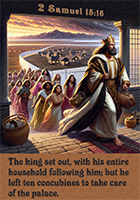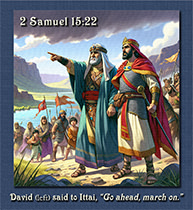2 Samuel 15:13–37 . . . Bible Study Summary with Videos and Questions
“David Flees for His Life”
In the first half of chapter 15 (see our summary of 2 Sam. 15:1–12), we saw how Absalom conspired against David. Today’s second half will reveal numerous discussions that inform David that the people of Israel have taken an interest in Absalom becoming their king. As a result, David must flee from Jerusalem. He’ll escape with a few servants and a bodyguard. Along the way, David’s needs will be met by foreigners, priests, servants, and Yahweh.
[Note: Click the link to This Week’s Passage near the bottom of this page to read today’s Scripture.]
Starting at the Palace (2 Samuel 15:13–16)
In today’s text, we read that word came to David that the people’s allegiance had turned to Absalom and that a full-scale rebellion was about to occur. It’s at this point that David decided to call for an urgent evacuation so that he and many of his followers could flee from Jerusalem. Just who’ll be numbered among his followers accompanying him (and who’ll remain behind in Jerusalem) will be determined by whether or not they’re true friends of David.
A messenger came to David with a report that he wasn’t eager to hear: “The hearts of the people of Israel are with Absalom.” David didn’t doubt or dispute the report. In fact, he even admitted that if they didn’t flee immediately, Absalom would not only attack the city of Jerusalem but would kill the king and his followers. Notice that the messenger’s report, as conveyed to the reader, does not indicate that Absalom had already “blown the trumpet,” declaring himself king (see 15:10). Neither is it said that Absalom was actually marching on the city. What was apparent was assumed imminent. It was time for David to act. He reluctantly accepted the report and acted on it. His servants told him that they were ready to do whatever he commanded.
David was a military strategist of the first order. From his fugitive days, he knew the value of a strategic retreat, which is what was called for here. If David stayed to fight, he’d inevitably lose and bloodshed would have been great, since Absalom was to “put the city to the sword” (v. 14b). David had been self-absorbed for years; but this sudden crisis forced him to look to the welfare of his people, so he called for an evacuation.
King David expected to eventually return to Jerusalem, though he submitted his fate entirely to God’s will. His expectation of a possible return is clearly expressed in his instructions to the priests, Zadok and Abiathar, when they attempted to flee with the Ark of the Covenant from Jerusalem (15:25–26). It’s important to realize that, in fleeing from Jerusalem, David hadn’t indicated his intention to abdicate the throne. That’s why he left ten concubines behind, to “take care of the palace” (v. 16).
He was leaving town but wasn’t leaving his throne. Absalom might have been able to seize it, but it wouldn’t happen because David had handed him his resignation. The concubines were a symbol of David’s intended continuing reign over Israel. Despite his deep grief and willingness to accept whatever judgment God intended, David’s actions reveal that he hoped and worked toward a restoration to his city and his throne.
Reaching the Outskirts (vv. 17–22)
It appears that David and those who intended to flee with him had formed a procession leading out of town. At “the edge of the city” David paused, allowing those going with him to pass ahead of him so he’d have the opportunity to allow some to accompany him while encouraging others to turn back. It’s here that some of David’s “old faithfuls” appear. Among them are the Kerethites, Pelethites, and Gittites, who were foreigners, not native Israelites. These men may have been an honor guard of sorts for David — his secret service agents, whose task it was to defend the king. A Gittite was a person from the Philistine city of Gath. Goliath was probably the most famous Gittite. So, the first major group of those loyal to David, who’d accompany him as he fled from Jerusalem, were foreigners, albeit non-Jewish Gentiles.
19The king said to Ittai the Gittite, “Why should you come along with us? Go back and stay with King Absalom. You are a foreigner, an exile from your homeland. 20You came only yesterday. And today shall I make you wander about with us, when I do not know where I am going? Go back, and take your people with you. May the Lord show you kindness and faithfulness” (2 Sam. 15:19–20).
In addition to this larger group of faithful non-Jews was a lone Gentile who’d come on the scene one day earlier: Ittai the Gittite. The author chose to direct our attention to Ittai for several verses (19–22). Ittai must have been both loyal and capable (since David will make him a commander of a portion of his troops in chapter 18). When Ittai marched by with his army of 600 Gittite mercenaries (v. 18), David gave him an opportunity to return to the city without any blame, calling him aside and urging him to return to his own land (v. 20). This wasn’t his fight; he needn’t endanger himself or those with him. Ittai’s reply probably reflects the sentiments of many of David’s followers that day.
Ittai the Gittite’s commitment to King David during Absalom’s rebellion is one of the most powerful and celebrated acts of loyalty in all of scripture. David urged him not to follow, but Ittai wouldn’t consider abandoning him. His commitment appears to be more than a personal attachment to David; it seems to have been part and parcel of his faith. He began his statement with the words, “As surely as the Lord lives,” which suggests that he was a true believer in the God of Israel and had no intention of going back to his own land and his own gods. So the Gittites, their families, and hundreds of others marched by, on their way to exile and a very uncertain future.
Crossing the Kidron Valley (vv. 23–29)
Leaving Jerusalem, David and those with him would have had to descend into the Kidron Valley, then ascend the Mount of Olives on the other side. Zadok and Abiathar, the priests, arrived with “all the Levites who were carrying the ark of the covenant” (v. 24). Note: The priests and Levites didn’t literally touch the Ark of the Covenant with their hands, but they did “carry the ark” as prescribed by God’s Law, meaning they transported it using the designated method. They set the ark down and waited for all those leaving the city to pass by, pausing where David was standing and making sacrifices to Yahweh outside the city until all the people had evacuated. Then David spoke to Zadok, instructing him to take the ark of God back to Jerusalem. If God was really with David, then He’d bring David back to Jerusalem, back to the place where God had chosen to dwell? If God wasn’t with him, David knew that the ark would do him no good.
If we didn’t know David better, we’d criticize his response as being resigned fatalism. But it wasn’t. David realized that the current threat arose as a result of the Lord’s discipline for his sins, prophesied by Nathan some years before. David was in a deep repentance mode, since we’ll soon read: “David continued up the Mount of Olives, weeping as he went; his head was covered and he was barefoot” (v. 30a).
This is a far cry from the mindset we saw in 1 Sam. 4 (see Week 5’s summary). There, when the Israelites suffered a defeat at the hands of the Philistines, the people fetched the ark, assuming it would somehow magically give them victory. Instead, the Israelites were defeated, Eli’s two sons were killed, and the ark was taken by the Philistines. Here, David didn’t see the ark as some kind of magic charm that could assure him of God’s presence or divine deliverance. Jerusalem was where the ark belonged, and David wouldn’t attempt to take it with him. So he told Zadok, “Go back to the city with my blessing” (v. 27, enlarge image left).
What’s more? David knew that Zadok was a priest and a prophet — in those days, prophets were also known as “seers” (see 1 Sam. 9:6–9). This meant that Zadok could give David trustworthy reports, and who wouldn’t want to receive a status report from a prophet? Zadok needed to be in Jerusalem to be with the ark, but he also needed to be there to give David the inside scoop on what was going on. So Zadok would use his two sons, Ahimaaz and Jonathan, to convey reports of Absalom’s plans to David, who’d be waiting by the fords of the wilderness (v. 28). This way, David could discern whether to retreat further into the wilderness, to remain where he was, or even to return to Jerusalem.
Ascending the Mount of Olives (vv. 30–37)
But David was weeping as he made his way to the top of the Mount of Olives. His head was covered and his feet were bare, like everyone accompanying him (v. 30). Covering one's head was a sign of dismay and despair (Jeremiah 14:3–4; Esther 6:12; Leviticus 10:6; 21:10), as was going barefoot (Micah 1:8). It was a very sad time for David and his people, but he wasn’t feeling sorry for himself. His attitude was clearly one of submission to Yahweh (vv. 25–26). So when David says, “Let him do to me whatever seems good to him” (v. 26b), he meant it. This is not weakness we’re seeing, but strength. Hearty faith! David knew that the Lord was with him, whether or not he had the ark of the covenant in his procession. He believed that it belonged in the capital city, that Yahweh was Israel’s God, and that the ark wasn’t David’s personal shrine to take with him wherever he went.
Through his tears, his mourning, and his repentance, we see a faith-filled, obedient David. But we’ll soon see David being the consummate strategist who’ll use the priests to set up an intelligence network inside occupied Jerusalem. David will ask Zadok the priest to use his eyes to observe what Absalom was doing, then send a report to David via his son Ahimaaz and Abiathar’s son Jonathan. David will wait at the west side of the ford, over the Jordan near Gilgal, until he receives word what to do next.
Then David received a report revealing that his wisest counselor, Ahithophel, had joined Absalom’s revolt. David’s reaction to learning that his trusted counselor, Ahithophel, had joined his son Absalom’s revolt was one of deep distress, alarm, and immediate spiritual reliance, indicating immense disappointment and sadness compounded by the political danger. That news became a most devastating blow for King David because Ahithophel’s previous counsel had been so reliable. His advice amounted to words coming from a teacher or rabbi who’d inquired of God’s word. Because David had been seeking God’s intercession, he was constantly in prayer, so he prayed: “LORD, turn Ahithophel’s counsel into foolishness” (v. 31b).
Hearing that Ahithophel had become one with Absalom, David uttered his prayer, asking God to somehow thwart the counsel of Ahithophel. David was encouraged to see God answering his prayer so quickly. As he reached the summit, he was met by his trusted friend, Hushai the Arkite. His robe was torn and he’d cast dust on his head as evidence of his mourning. He was probably an old man like David. On the long road to exile, he’d have been a burden. But David had a sensitive job for him to undertake. He was asked to be an double-agent advisor to Absalom, acting as Absalom’s man in charge of his “palace intelligence network.”
In vv. 33–36, things become very calculating. Hushai was ready to accompany David wherever he’d go. But David changed Hushai’s plans, informing him that if he’d accompany him into hiding, he’d be an added burden. However, Hushai could perform a more valuable service to David if he’d return to Jerusalem and pretend to be one of Ahithophel’s loyal supporters. Doing so, Hushai would be in a position to counter Ahithophel’s counsel by “frustrating his advice” (v. 34). David then informed Hushai that Zadok and Abiathar, the priests, were also loyal supporters who, after hearing something from the palace, the sons of both priests would send a timely message to David. As directed, Hushai went to Jerusalem, arriving the same time as Absalom.
Looking Closely at the Hearts of David and Absalom
What do you imagine when you hear or read the term “God’s favor”? We might immediately think of God’s favor as being an endless river of generous gifts, but that’s not the whole story. David shows us that God’s favor isn’t always an easy pill to swallow. Sure, he received a kingdom from the Lord (2 Sam. 7:8). That gift came with plenty of perks; but being a man after God’s own heart also came with challenges.
Likely, when Samuel anointed David as king, it was a happy occasion, mostly because Samuel never mentioned any of the following: (1) the possibility of David having to go face to face against a giant enemy (1 Sam. 17); (2) the potential death threats from the existing king (1 Sam. 18–23); and (3) the massive temptations that would come while being the most powerful man in the land (2 Sam. 11). And Samuel certainly didn’t mention the fact that David would have to fight against his own beloved son to keep his kingdom.
We find the story of Absalom’s rebellion in five chapters: 2 Sam. 13–18. The wheels started to come off his train when David’s son Amnon raped Absalom’s half-sister, Tamar. Her brother, Absalom (Amnon’s half-brother), was enraged by his brother’s sin and eventually had Amnon killed, which was a low blow for David. Absalom fled to live with his grandparents. During that two-year wait, a bitter root started to grow in his heart. Though David, his father, eventually welcomed him home with a kiss, Absalom began to plot his subversive coup, designed to enable him to take David’s throne. He launched a PR campaign, tricked 200 men into joining his cause, recruited David’s advisers, amassed an army, and prepared to march onto Jerusalem.
The same David who’d been promised a kingdom that was to last forever had to put on a disguise and run for his life. Though the battle cost him mightily — 20,000 casualties, including his own son — David kept his throne, just as God kept his promises. Yes, David was highly favored by God, but that didn’t vaccinate him from having to do hard work and endure severe heartbreak.
When we confuse God’s favor with a free ticket to Easy Street, we can find ourselves easily blindsided. As God’s child, you are highly favored. But that doesn’t mean that you’ll never be thrown a curve ball. Absalom’s rebellion shows us that our suffering isn’t a sure sign that God’s favor has left us. We’re to praise God, no matter if his favor brings us victories or challenges.
† Summary of 2 Samuel 15:13–37
Our passage recounts David’s hasty and emotional flight from Jerusalem, upon learning that Absalom’s conspiracy had gained massive support and that the hearts of the people of Israel were with his rebellious son (15:13). Recognizing the seriousness of the revolt and the danger of being trapped in Jerusalem, David decides to leave the city immediately with his household, loyal officials, and bodyguards — including the Cherethites, Pelethites, and Gittites — to avoid disaster and unnecessary bloodshed (vv. 14–18). As David departs, many loyal followers weep with him, reflecting the nation’s upheaval and the pain of his downfall. Ittai the Gittite declares his steadfast loyalty to David despite being a foreigner, prompting David to welcome him and his men as faithful companions on the journey (vv. 19–22).
Along the way, David encounters spiritual and practical moments of support and sorrow. The Levites bring the Ark of God, but David humbly sends it back to Jerusalem, declaring his trust in God’s will — if God favors him, David will return to see the Ark again; if not, God’s will must be done (vv. 24–26). David ascends the Mount of Olives barefoot and weeping, joined by the people, and learns that his counselor Ahithophel has joined Absalom, intensifying his distress (vv. 30–31). David prays for Ahithophel’s counsel to be frustrated and arranges for Hushai the Archite to return to Jerusalem as a covert informant to counteract Ahithophel’s advice and support David from within Absalom’s court (vv. 32–37). This passage highlights David’s vulnerability, faith, and wisdom in crisis, setting the stage for a suspenseful chapter in his kingship.
Key points with verse references:
• David decides to flee Jerusalem with his household, court officials, and loyal guards after hearing that Absalom has stolen the hearts of the people of Israel (vv. 13–16).
• Ittai the Gittite demonstrates remarkable loyalty to David and is welcomed to join him in exile, despite being a foreigner (vv. 19–22).
• The Levites arrive with the Ark of God, but David orders them to return it to the city, showing surrender to God’s sovereignty and trust in his will for the future (vv. 24–26).
• David and his followers ascend the Mount of Olives, weeping and mourning, as David hears the troubling news that Ahithophel, his trusted counselor, is now advising Absalom (vv. 30–31).
• David sends Hushai the Archite back to Jerusalem to serve as a secret ally, hoping he can undermine Ahithophel’s counsel and bring vital information to David (vv. 32–37).
This Week’s Passage
2 Samuel 15:13–37
New International Version (NIV) [View it in a different version by clicking here; also listen to chapter 15 narrated by Max McLean.]
Summary Video: “The Second Book of Samuel”
† Watch this introductory video clip created by BibleProject on bibleproject.com.
- Q. 1 Why did David flee Jerusalem rather than stay and fight?
- Q. 2 Why didn’t he take the ark with him into exile?
- Q. 3 Do David’s actions exhibit faith, fatalism, or submission? If so, why?





